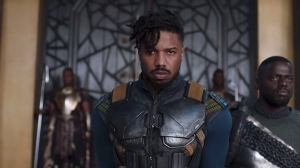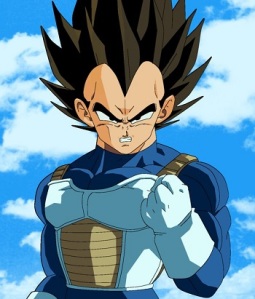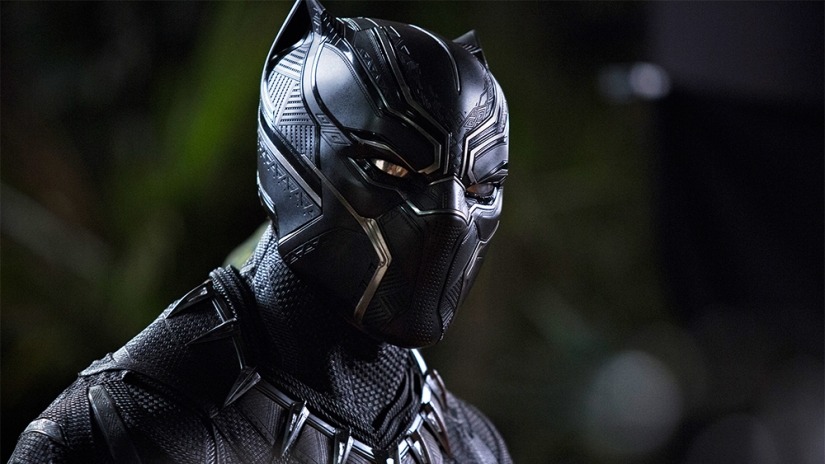Unless you’ve been living under a rock for the last few months, you know how big a hit Marvel’s Black Panther has been, both with audiences and with identity-politics-obsessed activists. The story focuses on T’Challa (Chadwick Boseman), king of the fictional African nation of Wakanda, and how he is forced to confront his family’s past evils and his country’s isolationist policies. The movie is a brilliant, if flawed entry in the Marvel Cinematic Universe, and I’ll get to the reasons why it is flawed, and what it gets right, in this blog post.
Director Ryan Coogler has basically scored a huge win for Marvel and for Disney, not only for a box office success but for deftly pandering to Black identity politics in a way that may be cynical and exploitative, but doesn’t quite feel like it is. The production budget is estimated at about $200 million (roughly $25 million under what it cost to produce Captain America: Civil War), with an estimated box office gross of about $1.325 billion as of this writing (which may change as the movie is still playing in some theaters). Marketing and advertising costs are typically about the same amount as the production budget, sometimes double that, but let’s assume for a moment that $200 million was spent on marketing and advertising because Disney really wanted this to do well and so put in a bigger effort to sell it to moviegoers, for example, plopping down $8.28 million for TV ads on opening weekend alone. Even accounting for merchandising licenses and the cut taken by theaters, Marvel and Disney still made a pretty nice profit here.
So clearly the movie was a hit with audiences, exactly as Disney hoped. I certainly enjoyed it when I went to see it in late February. But I’d be lying if I didn’t spot a number of deficiencies in the story and characters. They aren’t all that many, and what one critic took to task as a deeply conservative depiction of Wakanda and its natives, I think could actually be misinterpreted for reasons I’ll explain. So I’ll start with what I thought the movie got wrong, and then go into what I thought it got right, and why.
What Was Wrong
I’m not a fan of today’s trend of over-saturating every major production with CGI, and Black Panther is as guilty as any other of over-indulging in computer-generated imagery. Especially in the third act, it looked too fake and unbelievable, taking me out of the story somewhat, though not enough to completely spoil my experience. I’m not the only one to have noticed this problem. Today’s big-budget movie-making is far too obsessed with CGI, to the detriment of the final product. CGI is best used to enhance practical effects, as was the case with Spielberg’s adaptation of Michael Crichton’s Jurassic Park in 1993, and in James Cameron’s Terminator 2: Judgment Day. And really, considering how much went into making Black Panther, there’s simply no excuse for getting lazy with the visual elements.
To be fair, there was a lot of CGI that wasn’t rushed or skimped on, such as when we are treated to the initial views of Wakanda from the viewpoint of the hover UFO used by T’Challa to trek across the globe. And the sight of Wakanda’s capital city, with its blend of African and Art Deco aesthetics, was impressive to say the least. But in far too many instances, the movie looks like it was a green-screen job and that detracted from the movie.
Eric Killmonger, played by Michael B. Jordan, is arguably the real hero of the story, or more accurately, the anti-hero. His backstory is crucial to the crisis within the larger narrative, because without it there is no larger narrative. So why do we only get to see a glimpse of him early on, in the first act, then have him disappear until almost the second half of the movie, when he suddenly reappears to escalate things?
What’s more, for all Killmonger is supposed to embody the chickens of Wakanda’s isolationism coming home to roost, we don’t get to actually see much of what made Killmonger become this monster. His motives are in conflict: revenge competing with a crusade for the African diaspora, with the result being that the latter is subsumed by the former. So much of the action in the first half of Black Panther is taken up by the hunt for Andy Serkis’ character, Ulysses Klaue, that by the time Killmonger pops back up, the tonal shift is just too jarring and feels too contrived and insincere.
In the Marvel comics, Black Panther is the sixth smartest person in the world, at times outwitting Tony Stark. In the movie, however, he relies too much on the high tech devices crafted by his sister Shuri (Letitia Wright), who channel’s James Bond’s ‘Q’ as the resident gadget-maker. It is this over-reliance on technology and his inner circle of family and friends, that diminishes the character. In Spider-Man: Homecoming, Tony Stark lectures Peter Parker telling him that if he can’t be a hero without his superhero suit, he doesn’t deserve to wear it. Well, T’Challa has a similar conundrum, with the difference being that being a king, no one is going to tell him this. So even though T’Challa displays a fair amount of physical strength and fighting prowess, more often than not he is in the high tech suit instead of using his wits to win.
T’Challa is undeniably a fleshed out character who experiences a crisis of faith and ethics, and is challenged over the course of the narrative to grow and learn as a person. In that regard he is no Gary Stu concept. But he really ought to have doubted himself more, and the central conflict of the story should have put him in a far more vulnerable position spiritually and ethically than we got to see on the screen. His confrontation with the spirit of his father feels insincere, resolved far too quickly. For a movie that clocked in at around two and a half hours, there’s really no excuse for not devoting sufficient time to character development and growth. The movie spent far too much time with big stunt scenes and flashy SFX, that could have been better spent fleshing out the characters more and showing us their flaws and how those flaws are overcome.
Much of the story could—and probably should—have been dealt with over two films instead of being crammed into one, and as a result a lot of what worked best ended up being subsumed by the visual effects, thus heightening the visibility of the flaws within the narrative. I don’t know and can only speculate, but I got the impression watching Black Panther that maybe director Coogler wasn’t sure when or if he’d be able to direct a second movie, and so felt compelled to jam as much in as he could. I’m only guessing here. I could be wrong. But being analytical, it’s often that impressions I get when I watch a film or movie, an instinct or “gut feeling” if you will, come across in the viewing. I know when I’m being entertained or not, when the storyteller is laughing with or at me, when I’m being insulted. So, if your instinct when watching a movie is that there seems to be too much going on, it’s probably because there is.
What Was Right
Now, the above-listed items are not a comprehensive summary of the things I noticed that were wrong with the movie, and later viewings may add to or perhaps even alter my perception. But having mentioned what I thought was gotten wrong with Black Panther, it’s only fair that I now go into what I thought it got right, and I think it got more right than it got wrong. I should also point out that, this being a comic book movie and geared toward families with children than to adults exclusively, there’s only so deep it can be expected to go and still retain a wider audience. In that case, I can forgive the poorer elements of the narrative more easily than I would movies in other genres.
But I digress. Here’s a list of what I felt were Black Panther’s biggest strengths and why.
In my entry on The Last Jedi, I pointed out how there are no characters in it, only concepts, and poorly executed ones at that. This is by no means the case with Black Panther. Here we see fleshed out characters with backstories, flaws, doubts, conflicts, and arcs of evolution. They start off at one level and end up having grown as individuals learning a valuable lesson. This more than anything else is what makes a film or movie work. If your characters are one-dimensional concepts without flaws or anything to learn, they’re not believable or sympathetic, and so you’re unable to invest emotionally in them. So it was refreshing, after being insulted by TLJ, to see actual characters in Black Panther, even if they are under-developed with flawed executions.
Whereas Disney Star Wars, CBS’ STD, Paul Feig’s Ghostbusters reboot, and other of today’s movies engage in shameless, cynical Mary-Sue-ism, Black Panther treats its female characters with a measure of respect, portraying them as strong, smart, intelligent, and compassionate, and we know this because the movie shows them having and expressing these qualities. Women hold high positions within Wakanda’s military, and we can believe the things they do in the movie because their society and training require that they have the qualities necessary to be proper warriors capable of defending their nation from outside threats. They’ve been fighting from an early age, and so their skills and intelligence never feel artificial, but earned. THIS is how you write strong female characters. Granted, in Black Panther they are basically butt-kicking eye candy, as opposed to the rude, plainer-looking Ellen Ripley or the plain-looking-and-dressing, pathologically shy Laurie Strode; they certainly are not the stars of this movie, and so they’re basically tropes. But they’re well-executed tropes, and we believe them because they were written as believable.
Michael B. Jordan is obviously quite the Urban Otaku, and nowhere is this more evident than in the design of his mercenary duds.

Michael B. Jordan as Eric Killmonger

Vegeta from Dragon Ball Z
This was an awesome bit of anime fan service, subtly thrown in for kicks, and it actually complemented the character.
T’Challa is forced within the narrative to confront the evils of the past, in this instance, his father’s past. Steven Thrasher, writing for Esquire.com, complains that, “its ending political message [is] far more conservative than the revolutionary possibilities teased by anything with “Black” and “Panther” in the title.” This opinion is shared by Daryl M. Scott, who writes:
Relatively speaking, the conservatism of Wakanda is natural. Black Panther, T’Challa, got his power the old-fashioned way — aristocratic inheritance. His superpower and weaponry derive from the country’s unique heart-shaped herb and the metal vibranium. His powers would hardly be needed for protection against the African tribes surrounding Wakanda. They are for warding off the colonizers, who prey on other Africans and peoples of African descent. Rarely have subjects been so well protected.
The king’s subjects are well treated, too. In Hollywood’s Wakanda, women hold positions of power — the king’s sister, Shuri (Letitia Wright), controls the scientific and technological apparatus, and the fierce and stunningly beautiful female warriors, the Dora Milaje, protect and fight with their king. His male subjects are largely ornamental and ceremonial, leaving them to nurse their desire for one of their tribesmen to become the Black Panther.
This conservative utopia where only one is free could easily be revolutionized into the world’s most powerful democracy. Wakanda possesses the magical metal vibranium and the knowledge of how to grow enough of a heart-shaped herb to transform the king’s subjects into soldier citizens. The Black Panther is brilliant but only so enlightened; he cannot imagine a nation of black panthers to defend all of Africa from earthly and galactic enemies. The power is conserved for one king and one people.
It takes one who grew up in the belly of the colonizer, Erik Killmonger (Michael B. Jordan), to grasp the true revolutionary power of Wakanda. The offspring of a slave descendant and an unconquered Wakandan prince, Erik grew up nurturing two things: the right he had to claim the throne and his father’s belief that vibranium could be used to aid the struggles of blacks in the African diaspora against global white supremacy. Yet to realize his dreams, he becomes a killer in the army of the colonizers. He becomes known as Killmonger, a testimonial to his rapacious ability and desire to take human life.
This is arguably an accurate interpretation of how T’Challa and Wakanda are depicted in the story, but I think these and similar analyses miss the surprisingly subtle point of that depiction: Killmonger is actually right, though his methods are extreme, and T’Challa is forced to come to acknowledge that Wakanda can no longer hide its technology or its society from the rest of humanity or ignore the plight of Africans in other parts of the world. Wakanda is indeed a highly conservative nation full of contradictions: for all its advanced tech and social progressivism—women hold high positions of power and even lead entire armies—in many ways it is still a fundamentally backward society in which monarchs are often chosen, or defend their power, through fights that devolve into tap-out-or-die; that maintains patriarchal power dynamics; that expresses its greed in jealously guarding its wealth and technology to the point where not even members of the royal family are protected from the death sentence for daring to share any of it with outsiders; and that ignores the colonial predation of white nations against the rest of Africa, with any assistance being given by individuals such as Nakia, T’Challa’s love interest played by Lupita Nyong’o, taking the place of organized national efforts.
These inherent contradictions are not meant to proudly extol the virtues of political “centrism”, or the sort of false liberalism that generally is made to stand in for far right policies of oppression and exploitation hidden behind a mask of sane civility. No, that conservative Wakanda and its power dynamics are the cause of the conflict and misery, and Killmonger is the inevitable consequence of that conservatism. T’Challa is forced to realize that if he does not change and grow, if Wakanda does not change and grow, then there will be more and worse Killmongers down the line. Black Panther’s message is as much a damning critique of conservative/centrist ideology as it is of violent response thereto. T’Challa has to learn a vital lesson here, that Wakanda and its people are part of the world whether they like it or not, and the problems of the world and especially the African diaspora are also Wakanda’s problems, and they will no longer be ignored or allowed to go unaddressed.
Granted, because so much of Black Panther’s story was taken up with dazzling (and unacceptably unsatisfying) special effects and stunt sequences, the handling of this surprisingly potent political message came across as ham-handed, patronizing, and ultimately shallower than it should have been. But it’s there nonetheless, and it’s worth taking to heart, for doesn’t Wakanda also represent the United States under the regime of deeply conservative Democrat and status-quo-supporter Barry Obama? For a comic book movie, this was something I found refreshing, and while some might complain about the presence of politics in cinema, the fact is that cinema has often only ever been about politics in one form or another, with only levels of subtlety differentiating the more obvious ones from the sneakier political morality tales.
The movie’s political messaging, flawed as it is, serves as its biggest strength. I don’t know about you, but considering how utterly shallow far too many of today’s blockbuster movies and TV shows are, Black Panther’s message is a much-needed break and a satisfyingly complex narrative that aspired to greatness but fell short—but NOT for lack of trying.
If you compare the Marvel Cinematic Universe to date to Jar Jar Abrams’ Star Trek reboots, his and Ruin Johnson’s Star Wars demolition derby, Paul Feig’s trashing of Ghostbusters, Steven Moffat’s tenure running Doctor Who, CBS’ STD, and pretty much anything by Michael Bay, you get the sense that Marvel Studios under Kevin Feige has a genuine respect for its source material. Whatever you think of how the movie adaptations have been executed, it comes across on the screen that there is a real love for the comics on which their big screen versions are based. The others I mentioned only display unveiled contempt for the material, and open hostility toward fans thereof.
In Black Panther, you can tell how much love there is for the comic and the movie itself. The actors and actresses were clearly having a great time, and this comes across on the screen. There’s real chemistry there that obviously isn’t faked, or at least it doesn’t feel fake. In The Last Jedi, people are simply showing up and reciting their lines, and the only ones who actually had chemistry were Mark Hamill and Carrie Fisher in their one and only reunion scene. Everyone else was basically just phoning it in, watching the clock, going through the motions.
Final Analysis
Much of the credit for the success of Black Panther lies with writer-director Ryan Coogler and co-writer Joe Robert Cole, both of whom made an honest effort to create something truly great even if that effort came up short in many ways. But a fair degree of credit must be given to producer Kevin Feige, who at the helm of the Marvel Cinematic Universe has demonstrated that he has a clear vision for what he wants to do with the larger narrative, what direction he wants it to go in, and a likely end destination that will wrap everything up in a satisfying manner.
For all its shortcomings, Black Panther had far more positives than negatives, and so for that reason I give the movie a score of six-and-a-half to seven out of ten (half point for Killmonger’s Vegeta costume, heh heh). It definitely could have been better, but I think a sequel by Coolger and Cole can be expected to be better written and more developed—IF they learn from critical analyses like this. Time will tell if they iron out the narrative wrinkles.
If you haven’t gone to see Black Panther on the big screen yet and want to enjoy it in the theaters, go now while you still can. It’s not the same on a TV monitor.


Reblogged this on Mike's Movie & Film Review.
LikeLike